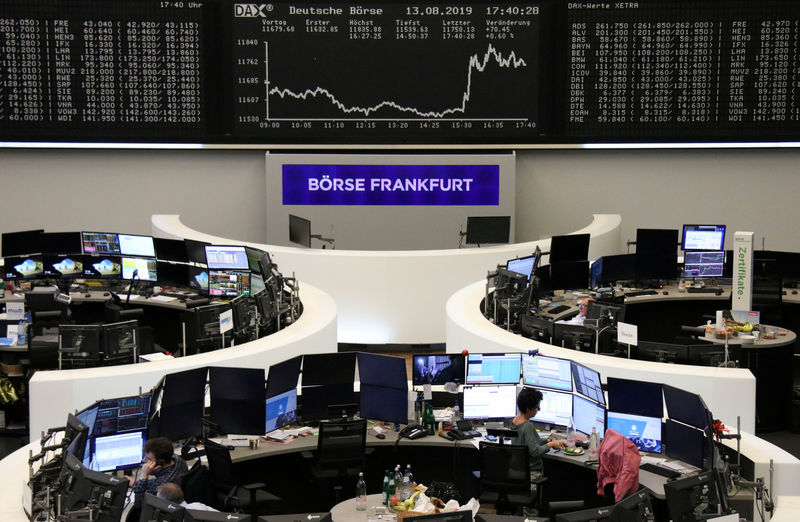By Herbert Lash
NEW YORK (Reuters) - Equity markets tanked and oil prices fell sharply on Wednesday after a closely watched bond indicator pointed to the growing risk of a U.S. recession that was heightened by data showing Germany's economy in contraction and China's worsening.
Yields on two-year U.S. Treasury notes rose above the 10-year yield for the first time since 2007, a metric known as an inversion that is widely seen as a classic recession signal.
A GDP report showing German output fell 0.1% in the second quarter from the previous three months coupled with Chinese industrial production rising at its weakest pace since 2002 added to investor fears of a global slowdown in growth.
U.S. stocks fell almost 3% and major equity indices in Europe closed down 2% or near that while crude prices slumped almost 5% at one point.
The yield on the benchmark 10-year U.S. Treasury note (US10YT=RR) fell below 1.6% to its lowest since September 2016, as investors sought safety from the equity market carnage.
"The combination of those three things (yield inversion, Germany's GDP and Chinese industrial production) has refreshed fears of a global slowdown," said Michael Arone, chief investment strategist at State Street (NYSE:STT) Global Advisors in Boston.
"We're seeing that flow through to stock prices falling and yields across the globe plummeting as well," he said.
The slide in equity and oil markets erased the previous session's sharp gains after the United States moved to delay tariffs on some Chinese products.
China's offshore yuan
MSCI's gauge of global equity performance (MIWD00000PUS) fell 1.98% and its emerging market index (MSCIEF) fell 0.59%. The FTSEurofirst 300 index (FTEU3) of leading European shares closed down 1.62%.
The Bovespa index (BVSP) fell more than 3% and the Mexican bolsa (MXX) slid 2%. Bay Street in Toronto (GSPTSE) fell 1.75%.
Negative interest rates from the European Central Bank and Bank of Japan are creating an adverse effect on yields everywhere, including the United States, Arone said.
"How much more can U.S. interest rates rise in the face of all those low interest rates? In a lot of ways it's almost like the medicine continues to make the patient more sick," he said.
The market rout is likely due, at least in part, to program trading that was triggered by the yield inversion, said Randy Frederick, vice president of trading and derivatives for Charles Schwab (NYSE:SCHW) in Austin, Texas.
"This level of sell-off is primarily driven by institutional program trades," he said. "Moves of this magnitude are mostly driven by programs that are tied to" the inverted yield curve.
On Wall Street, the interest-rate sensitive bank index <.SPXBK> slipped 4.22% and the broader financial sector (SPSY) fell 3.36%.
The dollar index (DXY) added 0.17% and the euro (EUR=) fell 0.3% to $1.1138. The Japanese yen strengthened 0.77% versus the greenback at 105.91 per dollar.
U.S. West Texas Intermediate (WTI) crude futures (CLc1) dropped $1.87 to settle at $55.23 a barrel, having gained 4% in the previous session, the most in just over a month. London Brent (LCOc1) fell $1.82 to settle at $59.48 a barrel.
U.S. gold futures
"There is plenty of doom and gloom to spread across the globe," said John Doyle, vice president for dealing and trading at Tempus Inc in Washington. The U.S. yield curve "is a major recession indicator. Germany, Italy and the UK are likely headed for a recession. Today's Chinese data was shockingly bad."

Graphic: World FX rates in 2019 - http://tmsnrt.rs/2egbfVh